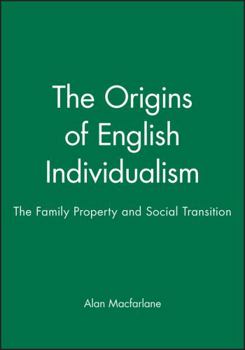The Origins of English Individualism: The Family, Property and Social Transition
Select Format
Select Condition 
Book Overview
The Origins of English Individualism is about the nature of English society during the five centuries leading up to the Industrial Revolution, and the crucial differences between England and other... This description may be from another edition of this product.
Format:Hardcover
Language:English
ISBN:0631193103
ISBN13:9780631193104
Release Date:January 1991
Publisher:Wiley-Blackwell
Length:232 Pages
Weight:1.18 lbs.
Dimensions:0.8" x 6.4" x 9.3"
Customer Reviews
1 rating
English Exceptionalism and the Great Tradition
Published by Thriftbooks.com User , 23 years ago
In this book, the author examines the nature of English society during the five centuries prior to the Industrial Revolution, emphasizing the key differences between England and other nations. Citing numerous studies of medieval English life, he challenges the now entrenched theoretical framework (i.e. the "Whig" interpretation of history) originally promoted chiefly by Macaulay, Marx and Weber in which all societies are placed at various points along an inevitable development path, beginning with primitive feudalism and ending with modern capitalism. In place of this theory, he posits a theory of English exceptionalism, the idea that there has indeed been something special about England. He shows at length how medieval England fails to fit standard definitions of "peasant" society and in fact displayed the distinctive marks of individualism as early as the 13th century. Macfarlane doesn't claim to trace individualism to its roots (admitting that requires further study, although he suspects Montesquieu was right in assuming the English adopted it from Germanic roots, citing Tacitus' On the Manners of the Germans, which describes this "beautiful system [that] was invented first in the woods" based on absolute individual property), only that it predates (and in fact influenced) the Renaissance, Reformation and Enlightenment, events which are typically called upon to explain its emergence (he notes that some recent scholarship concedes some roots lie deep in biblical and classical times). The English tale of Robinson Crusoe (drawing on cover) embodies this seemingly uniquely English (in medieval times) tradition.The author acknowledges that the established view is especially appealing to our modern hope for development in the third world (improving life from harsh, "nasty, brutish and short" to humane, mobile and affluent with loving, nuclear families) and also offers the attractive notion of "progress" from "lower" to "higher" forms of societal organization. The primary implication of his thesis is that there is no necessary set of evolutionary stages from feudalism to individualism, from hierarchy to equality. Rather, these are alternative systems, which may coexist in time. Further, the nuclear family system, far from being a recent and transient development (as many have claimed), is ancient, durable and flexible, its simple molecular structure very likely allowing societal change to proceed rapidly in areas such as industrialization and urbanization. The theory sheds light on why market liberalism has failed to take root in the third world.While Macfarlane traces the roots of Western individualism and capitalism to the early 13th century and suspects Germanic roots before that, his thesis ties nicely into the notion of the Great Tradition, defended by Lord Acton and others (see M. Stanton Evans' The Theme is Freedom for a modern defense), which asserts that these traits, along with libery, progress, popular sovereignty, science, the rul





